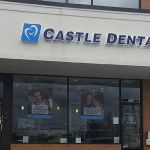Signs That You Need a Dental Cleaning
Regular dental cleanings are essential for maintaining healthy teeth and gums. However, many people often wonder how to know when it’s time for a cleaning. While your dentist can always tell you when it's time for a professional cleaning, there are some key signs that you can look for to determine if you might need one. In this article, we'll explore common signs that indicate you need a dental cleaning and why regular check-ups are important for your overall health.
1. Persistent Bad Breath
Bad breath, or halitosis, is a common sign that you may need a dental cleaning. While occasional bad breath is normal, persistent foul breath can indicate a buildup of plaque or tartar, which is a breeding ground for bacteria. This can result in gum disease, an infection that can be prevented with a proper cleaning. If brushing and flossing regularly don't help with your bad breath, it's time to schedule a dental cleaning.
2. Bleeding Gums
One of the most common signs that you need a dental cleaning is bleeding gums. If your gums bleed when brushing or flossing, it’s an early indication that plaque has hardened into tartar below the gum line. Tartar can irritate your gums and lead to gum disease, which causes inflammation and bleeding. Professional dental cleaning can remove the tartar and help restore your gum health.
2.1 Gingivitis
Gingivitis is the early stage of gum disease and is often characterized by swollen, red gums that may bleed. This condition can be reversed with proper dental cleaning and care. If left untreated, gingivitis can develop into periodontitis, a more serious condition that can lead to tooth loss.
3. Plaque and Tartar Buildup
If you notice visible plaque buildup along your gum line or on your teeth, it’s time for a cleaning. Plaque is a sticky film of bacteria that forms on your teeth and can harden into tartar if not removed. Tartar can only be removed by a professional cleaning, and if left untreated, it can lead to cavities and gum disease.
4. Tooth Sensitivity
Tooth sensitivity can be a sign that you have a buildup of tartar or an untreated cavity. If your teeth are sensitive to hot, cold, or sweet foods, it could indicate that the enamel is thinning or that there is plaque buildup near your gum line. A professional cleaning can help alleviate some of the sensitivity and prevent further damage to your teeth.
4.1 Causes of Sensitivity
Sensitivity can also occur when gums start receding, exposing the tooth roots. This is another area where regular dental cleanings are essential, as they help maintain gum health and prevent further recession of the gums.
5. A Yellowish or Brownish Tint on Your Teeth
If you notice that your teeth are turning yellow or brown, it’s likely a result of tartar buildup. This discoloration is often the first sign that it’s time for a cleaning. Tartar can cause staining that brushing and flossing can’t remove. A professional cleaning will not only remove the buildup but also leave your teeth looking whiter and healthier.
6. Dry Mouth
A dry mouth can be caused by a variety of factors, including medication, dehydration, or mouth breathing. It’s also a condition that can contribute to plaque buildup, as there isn’t enough saliva to wash away food particles and bacteria. If you’re experiencing dry mouth along with other symptoms of gum disease, it’s essential to get a dental cleaning to restore moisture and balance in your mouth.
7. Receding Gums
Receding gums are a sign that the tissues surrounding your teeth are shrinking, which may be due to gum disease or improper brushing technique. If you notice that your gums are pulling back from your teeth, exposing more of the tooth’s surface or even the roots, it's time to see a dentist. A dental cleaning can help remove tartar and bacteria from beneath the gum line, reducing inflammation and preventing further recession.
8. Poor Overall Oral Hygiene Habits
If you’re not brushing and flossing regularly, your teeth and gums are at a higher risk of developing plaque, tartar, and gum disease. Even with the best at-home care, professional dental cleanings are necessary to remove tartar and polish the teeth, leaving them cleaner and healthier. If you’ve neglected your oral hygiene routine or skipped a few cleanings, it’s time to visit your dentist for a professional cleaning.
8.1 Brushing and Flossing Techniques
Using the correct brushing technique and flossing regularly can help reduce plaque buildup between cleanings. Ask your dentist for tips on how to brush and floss effectively, as improper techniques can lead to ineffective cleaning and gum disease.
9. How Often Should You Get a Dental Cleaning?
The American Dental Association recommends scheduling a dental cleaning at least every six months. However, if you have risk factors for gum disease, such as smoking or a history of gum problems, you may need more frequent visits. Your dentist can help determine the appropriate cleaning schedule based on your oral health needs.
Maintaining regular dental cleanings is essential for preventing tooth decay, gum disease, and other oral health issues. If you’ve noticed any of the signs mentioned in this article, it’s time to book an appointment with your dentist. Regular checkups will not only keep your smile bright but also protect your overall health. For more information on dental cleaning services, visit Dentistry Toothtruth for expert advice and product recommendations.







 Long Grove Dental5.0 (1022 review)
Long Grove Dental5.0 (1022 review) Castle Dental & Orthodontics4.0 (249 review)
Castle Dental & Orthodontics4.0 (249 review) Leonard I Nunnally III DDS4.0 (107 review)
Leonard I Nunnally III DDS4.0 (107 review) Great Expressions Dental Centers - Midtown4.0 (1130 review)
Great Expressions Dental Centers - Midtown4.0 (1130 review) Barrett Family Dental of Tacoma5.0 (412 review)
Barrett Family Dental of Tacoma5.0 (412 review) Davies Dental5.0 (1 review)
Davies Dental5.0 (1 review) The Importance of Oral Health Education During Pregnancy for a Healthy Pregnancy
The Importance of Oral Health Education During Pregnancy for a Healthy Pregnancy Best Tips for Brushing Your Teeth Properly for Healthy Gums: Essential Techniques for Oral Health
Best Tips for Brushing Your Teeth Properly for Healthy Gums: Essential Techniques for Oral Health Why Skipping Dental Checkups Can Lead to Bigger Oral Health Problems
Why Skipping Dental Checkups Can Lead to Bigger Oral Health Problems Advantages of Porcelain Dental Restorations
Advantages of Porcelain Dental Restorations How Can Diabetes Cause Tooth and Gum Problems? Preventing and Managing Oral Health Issues
How Can Diabetes Cause Tooth and Gum Problems? Preventing and Managing Oral Health Issues Healthy Habits for Promoting Good Oral Health and Hygiene: Tips for a Healthy Smile
Healthy Habits for Promoting Good Oral Health and Hygiene: Tips for a Healthy Smile